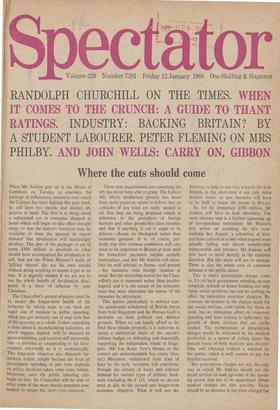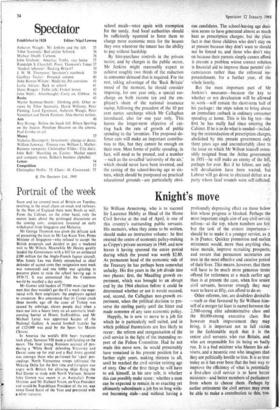Where the cuts should come When Mr Jenkins gets up
in the House of Commons on Tuesday to announce the package of deflationary measures over which the Cabinet has been fighting this past week, he will have two specific and distinct ob- jectives in mind. The first is to bring about a substantial cut in consumer demand at home which will begin to take effect straight away, so that the nation's resources may be available to meet the upsurge in export demand that devaluation will increasingly produce. This part of the package—a cut of some £500 million is involved—is what should have accompanied the devaluation it- self, had not the Prime Minister's habit of 'talking success' (to use his own words) without doing anything to ensure it got in its way. It is urgently needed if we are not to see the whole benefit of devaluation dissi- pated in a blaze of inflation by next Christmas.
The Chancellor's second objective must be to secure the longer-term health of the economy by taking steps to cut back the rapid rate of increase in public spending, which has got seriously out of step with that of the economy as a whole. Unless something is done about it, manufacturing industries, on which exports depend, will be doomed to quasi-stagnation, and taxation will inexorably rise—a prospect as unappealing to the Gov- ernment electorally as it is economically. This long-term objective also demands im- mediate action, simply because the level of government spending at any time depends on policy decisions taken some years before. Moreover, once the public spending cuts begin to bite, the Chancellor will be able to relax some of the more drastic measures now needed to secure the short-term situation. These twin requirements are something the left has never been able to grasp. The Labour left, whose intellectual poverty has never been more apparent, seems to believe that no cutbacks of any kind are really needed at all, that they are being prepared simply in deference to the prejudices of foreign bankers and other gnome-like class enemies, and that if anything is cut it ought to be defence—chosen on ideological rather than economic grounds. It is, of course,. per- fectly true that overseas confidence will con- tinue to be important to Britain at least until the looked-for payments surplus actually materialises, and that Mr Jenkins will there- fore be well advised to frame—and present —his measures with foreign opinion in mind. But the overriding reason for the Chan- cellor's axe is economic rather than psycho- logical; and it is the nature of the economic need that must determine the nature of the measures he introduces.
This applies particularly to defence cuts. An accelerated withdrawal of British forces from both Singapore and the Persian Gulf is desirable , on both political and defence grounds. When we can barely afford to de- fend these islands properly, it is ludicrous to spend a substantial share of the nation's defence budget on defending and financially supporting the independent island of Singa- pore. (Mr Lee Kuan Yew's threats in this context are understandable but empty blus- ter.) Moreover, withdrawal from East of Suez by the early 'seventies will contribute, through the closure of bases and reduced demand for various types of military hard- ware (including the F 111, which we do not need at all), to the second and longer-term economic objective. What it will not do. first action on assuming the DEA over- lordship last August, a relaxation of hire- purchase controls at a time when exports were actually falling, was almost unbelievably irresponsible and perverse. Mr Jenkins will now have to move sharply in the opposite direction. But this alone will not be enough. There is also the whole area of consumer demand in the public sector.
This is where prescription charges come in, To cut back government spending on new hospitals, schools or house building not only raises social problems but can do nothing to affect the immediate economic situation. By contrast, an increase in the charges made for the social services, with-reliefs for those in need, has an immediate effect on consumer school meals—once again with exemption for the needy. And local authorities should be sufficiently squeezed to force them to charge more economic rents for the houses they own wherever the tenant has the ability to pay without hardship.
By hire-purchase controls in the private sector, and by charges in the public sector, Mr Jenkins might reasonably expect to achieve roughly two thirds of the reduction in consumer demand that is required. For the rest, taking advantage of the 'Back Britain' mood of the moment, he should consider imposing, for one year only, a special sur- charge on both income tax and the em- ployee's share of the national insurance stamp, following the precedent of the 10 per cent surtax surcharge which Mr Callaghan introduced, also for one year only. This leaves the longer-term objective of cut- ting back the rate of growth of public spending in the 'seventies. The proposed de- fence cuts will make an important contribu- tion to this, but they cannot be enough on their own. Most forms of public spending, in fact, will need to be pruned, and a number —such as the so-called 'university of the air,' which should never have been invented, and the raising of the school-leaving age to six- teen, which should be postponed on practical educational grounds—are particularly obvi- ous candidates. The school-leaving age deci- sion seems to have generated almost as much heat as prescription charges; but the plain fact is that those children who don't stay on at present because they don't want to should not be forced to, and those who don't stay on because their parents simply cannot afford it present a problem whose correct solution is financial aid to improve those parents' cir- cumstances rather than the enforced im- poverishment, for a further year, of the whole family.
But the most important part of Mr Jenkins's measures—because the key to whether or not devaluation will be allowed to work—will remain the short-term half of his package : the steps taken to bring about an immediate cutback in ordinary consumer spending at home. This is his big test—the first he has really had since entering the Cabinet. If he is to do what is needed—includ- ing the reintroduction of prescription charges, abolished by this present government -only three years ago and uncomfortably close to the issue on which Mr Wilson himself osten- sibly resigned from the Attlee government in 195I—he will make an enemy of the lek perhaps for ever. But if he falters, not only will devaluation have been wasted, but Labour will go down to electoral defeat as a party whose fatal wounds were self-inflicted.































